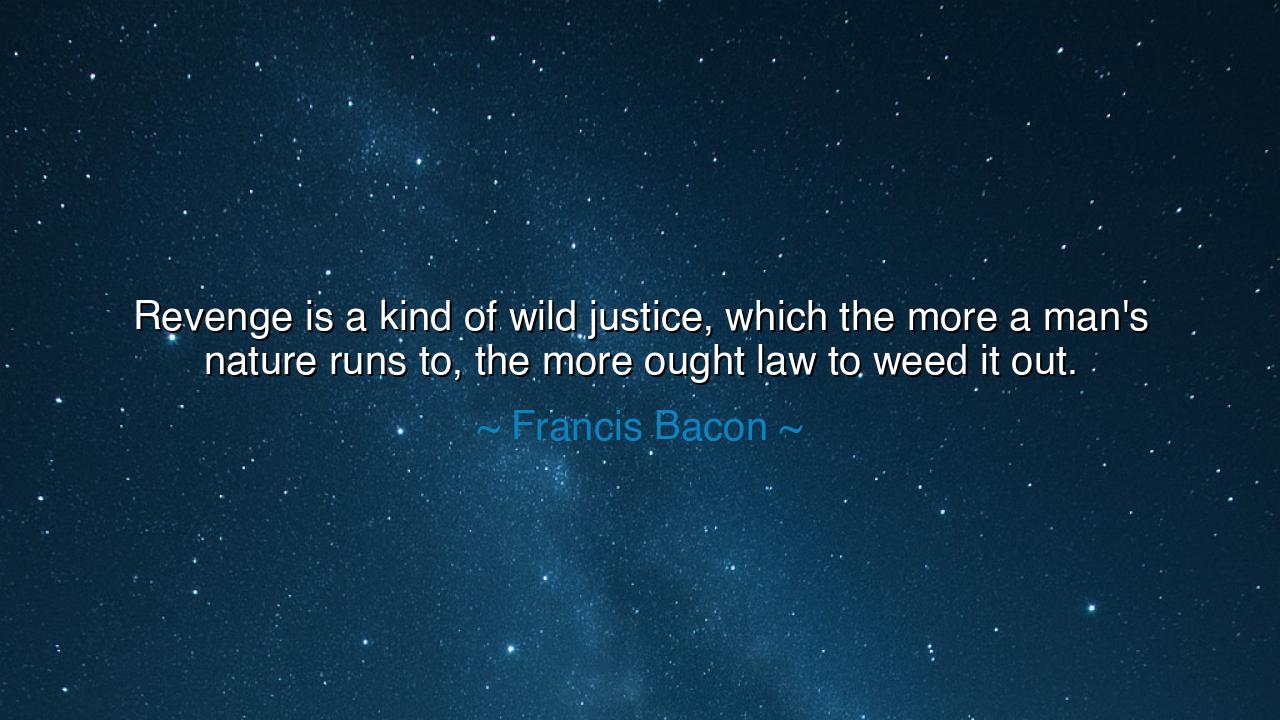
Revenge is a kind of wild justice, which the more a man's nature
Revenge is a kind of wild justice, which the more a man's nature runs to, the more ought law to weed it out.






The philosopher and statesman Francis Bacon, in his meditations on human passion and law, declared with timeless clarity: “Revenge is a kind of wild justice, which the more a man's nature runs to, the more ought law to weed it out.” In these words, he unearths the duality that has haunted mankind since its first quarrels: the deep thirst for vengeance and the higher call of order. For revenge appears, at first, to be justice itself—a man wronged strikes back, balance is restored. Yet Bacon calls it wild justice, untamed, dangerous, like fire that rages without control. What seems right to the heart, if left unchecked, becomes ruin to society.
The origin of Bacon’s phrase lies in the world he inhabited—an England marked by duels, feuds, and bloodshed, where men often took justice into their own hands. The law, still shaping itself into a stronger system, was often seen as too slow or too weak, and so men satisfied their honor with the sword. Bacon, a lawyer and judge, saw the danger clearly. If every injury gave birth to private vengeance, then peace would vanish, and the realm would collapse into endless cycles of retribution. Thus he warned: the law must “weed out” this impulse, just as a gardener pulls up the roots of weeds before they choke the good grain.
History gives us grim witnesses to this truth. Consider the vendettas of Renaissance Italy, where families like the Montagues and Capulets of Shakespeare’s tale destroyed themselves through cycles of vengeance. One insult, one wound, one murder demanded another, until whole lineages were consumed. Or recall the blood feuds of the Scottish Highlands, where generations avenged slights long forgotten, and peace was a stranger. In each case, revenge was taken as justice, but it was a wild justice, leaving only desolation in its path.
Yet Bacon does not deny the primal appeal of revenge. He acknowledges it as justice’s shadow, a raw instinct that seeks to balance the scales. To the man wronged, revenge feels righteous, even sweet. But sweetness turns to bitterness, for revenge rarely ends with a single blow. One injury calls forth another; justice gives way to cruelty, and the avenger becomes what he hated. Thus the law must rise higher than passion, providing a justice that is measured, impartial, and final—so that men may find peace not by their own hands, but by the authority of truth.
The deeper meaning of Bacon’s counsel is that true civilization is built not on vengeance, but on restraint. The stronger a man’s nature inclines toward revenge, the more he must discipline himself, or be disciplined by the law. For the greatness of the soul is not in striking back, but in mastering itself. To forgive may seem weakness, yet in reality it is the victory of reason over impulse, of order over chaos, of cultivated justice over wild justice.
The lesson for us is clear: do not let the desire for revenge consume you. When wronged, remember that striking back in kind makes you alike to the offender, while seeking justice through righteous means lifts you above him. The law—whether of man or of conscience—exists to free us from the chains of passion, to stop the spiral of violence before it destroys all. The wise man entrusts his cause not to the sword of anger, but to the scales of justice.
Practically, this means cultivating patience and trust in just systems, and where they fail, choosing restraint over rage. It means remembering that vengeance promises satisfaction but delivers emptiness. And it means striving to forgive—not because the wrong was small, but because your soul is too great to be ruled by bitterness.
Thus Bacon’s words ring across the centuries: “Revenge is a kind of wild justice.” Wild, untamed, seductive, but destructive if left ungoverned. Let the law, let reason, let virtue weed it out. For the true strength of a man, and of a nation, lies not in how fiercely it strikes back, but in how wisely it governs its passions, turning chaos into order, and wrath into peace.






AAdministratorAdministrator
Welcome, honored guests. Please leave a comment, we will respond soon